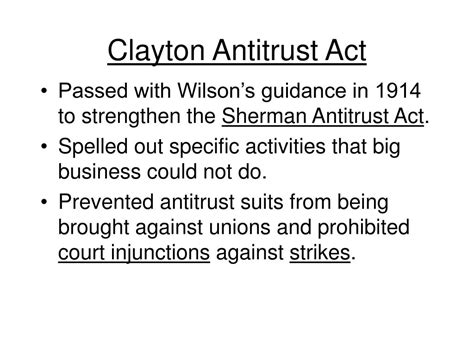Clayton Antitrust Act Explained
The Clayton Antitrust Act of 1914, also known as the Clayton Act, is a United States federal antitrust law that prohibits certain business practices considered anti-competitive and unfair. It complements the Sherman Antitrust Act of 1890, which focused on preventing monopolies and cartels. The Clayton Act addressed specific behaviors that could lead to the creation or strengthening of monopolies, such as price discrimination, tying arrangements, and interlocking directorates.

Objectives of the Clayton Act
The primary objectives of the Clayton Act are to:
- Prevent the formation and spread of monopolies
- Protect small businesses from unfair competition
- Promote economic efficiency and competition
- Ensure that businesses operate in a competitive market environment
Key Provisions of the Clayton Act
Section 2: Price Discrimination
Prohibits price discrimination by sellers where the difference in prices charged for the same product does not reflect a difference in cost. This provision aims to prevent large companies from using predatory pricing to drive out smaller competitors.
Section 3: Tying Arrangements
Prohibits tying arrangements, where a seller requires the purchase of one product (the “tying product”) in order to obtain another (the “tied product”). This provision prevents companies from using their market power in one product to gain an advantage in another.
Section 7: Mergers and Acquisitions
Prohibits mergers and acquisitions that substantially lessen competition or tend to create a monopoly. This provision aims to prevent the creation or strengthening of dominant market positions by large corporations.
Section 8: Interlocking Directorates
Prohibits interlocking directorates, where a person serves on the board of directors of two competing companies. This provision aims to prevent conflicts of interest and the exchange of confidential information between rival firms.
Impact of the Clayton Act
The Clayton Act has had a significant impact on the antitrust landscape in the United States. It has:
- Curbed the growth of monopolies and cartels
- Protected small businesses from unfair competition
- Fostered a more competitive market environment
- Contributed to the enforcement of antitrust laws
Case Studies
Standard Oil Company of New Jersey v. United States (1911)
This case led to the breakup of Standard Oil into 34 separate companies, demonstrating the Clayton Act’s ability to dismantle monopolies.
United States v. Paramount Pictures, Inc. (1948)
This case ruled against Paramount Pictures for engaging in block booking, a tying arrangement where theaters were required to purchase a bundle of films to show a single movie.
Microsoft Corporation v. United States (2000)
This case found that Microsoft had engaged in anti-competitive practices, including tying its operating system to its Internet Explorer browser.
Clayton Act in APUSH
The Clayton Antitrust Act is a crucial topic in the Advanced Placement United States History (APUSH) curriculum. It is essential for students to understand its provisions, objectives, and impact to succeed on the APUSH exam.
Key Terms for APUSH:
- Antitrust law
- Monopoly
- Price discrimination
- Tying arrangement
- Merger
- Interlocking directorate
FAQs
Q1: What is the purpose of the Clayton Act?
A1: The Clayton Act aims to prevent monopolies, protect small businesses, and promote competition in the market.
Q2: What are the key provisions of the Clayton Act?
A2: The key provisions include prohibition of price discrimination, tying arrangements, certain mergers and acquisitions, and interlocking directorates.
Q3: How does the Clayton Act affect businesses?
A3: The Clayton Act prevents businesses from engaging in anti-competitive practices that could stifle competition or create monopolies.
Q4: How does the Clayton Act impact the economy?
A4: The Clayton Act promotes a competitive market environment, which can lead to lower prices for consumers, innovation, and job creation.
Conclusion
The Clayton Antitrust Act is a cornerstone of antitrust law in the United States. It has played a vital role in preventing monopolies, protecting small businesses, and ensuring fair competition. Understanding the provisions, objectives, and implications of the Clayton Act is essential for students studying APUSH and anyone interested in the history of antitrust law.
